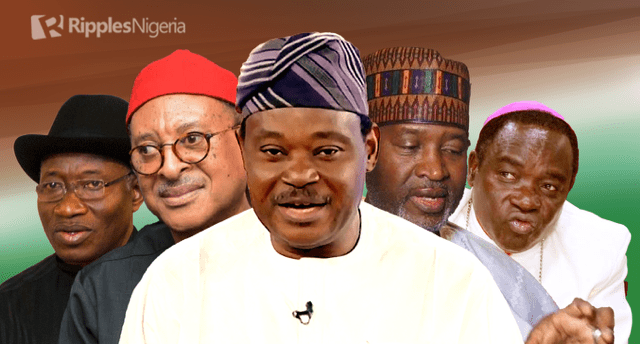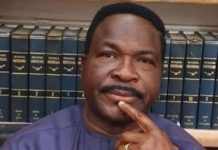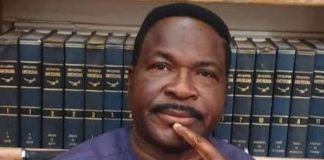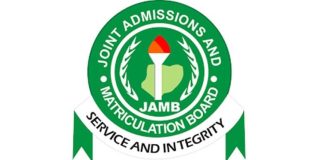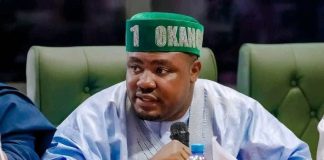🌿 Ruzu Non-Alcoholic Herbal Bitters
Ruzu Non-Alcoholic Herbal Bitters is a natural health supplement specially formulated to:
- ✅ Promote general wellness
- ✅ Detoxify the body
- ✅ Support the treatment of various ailments
Made from a powerful blend of 100% organic and medicinal herbs, Ruzu is completely alcohol-free, making it ideal for:
- 👪 All age groups
- 🌱 Health-conscious individuals
- 🌿 Anyone seeking non-alcoholic herbal remedies
Whether you're looking to boost your vitality, cleanse your system, or support healing the natural way, Ruzu Bitters offers a trusted herbal solution.
The Catholic Bishop of Sokoto Diocese, Matthew Kukah, last week blamed the current wave of banditry and terrorism on the country’s neglect of education.
The same week, a political economist, Prof. Pat Utomi, gave a damning verdict of Nigeria’s political system and demanded an immediate change to put the country on the path of sustainable progress.
These and three other stories we tracked dominated public discourse in the country last week.
1. Kukah’s take on Nigeria’s insecurity
On May 11, Rev. Kukah identified the neglect of education by successive governments as the cause of the country’s current security challenge.
The cleric, who spoke at the Rotary International conference in Abeokuta, Ogun State, said: “We are facing the challenges that are the consequences of our children not having education.
“Now everybody is fearing bandits, everybody is fearing Boko Haram. We are reaping today what we sowed yesterday and it will grow worse.
“We have millions of children at least between 10 and 12 or 15 million children that are on the streets who are begging, each of these children are growing by the day.
“The Almajiri that is 10 now, in 10 years he will be 20 years so unless we quickly do something the situation may get worse.”
Why it matters
The fiery preacher may have hit the nail on the danger of having a large number of children who should be in school roaming the streets across the country.
It is a sad reminder of how the country’s authorities have neglected the sector which ordinarily should be the conveyor belt of quality leaders for Nigeria in years to come.
The remark casts further light on the government’s failure to address the twin problems of unemployment and poverty in the country.
While the challenge persists, it can be safely assumed that the large army of out-of-school children and unemployed youths across the country would always become willing tools in the hands of desperate politicians and extremist groups as seen with Boko Haram and other criminal groups in the Northern part of the country.
2. Utomi’s verdict on Nigeria’s political system
The respected political economist, Prof. Pat Utomi, said on May 9 that Nigeria’s political system has failed and cannot deliver a new country the citizens desire.
Utomi, who addressed journalists in Lagos, revealed that efforts to form a mega political party to wrest power from the All Progressives Congress (APC) in 2027 are ongoing.
He stressed that the redemption of the country cannot be achieved by the APC or any of the opposition parties.
He said: “It is precisely the reason I arrived in Nigeria yesterday (Wednesday) to continue that work (formation of mega party).
“I believe that the political party system in Nigeria has failed. Political parties are not democratic and they are not serving the purpose.
“Political parties and politicians of these parties cannot save Nigeria now. It is clear.”
Why it matters
Utomi has spoken the mind of Nigerians on the country’s political system with many of the political parties that had featured in the elections since 1999 lacking in ideologies.
Many of the political parties to put succinctly are simply collections of strange bedfellows who came together to take part in elections with the ultimate goal of grabbing power and sharing the spoil of offices.
3. Jonathan decries abandonment of his govt’s policies
Former President Goodluck Jonathan on May 11 expressed disappointment that some innovative ideas he introduced while in power were discarded by his successors.
Jonathan, who spoke at the 25th anniversary celebration of Igbinedion University, Okada, Edo State, highlighted the challenges he faced in implementing progressive policies, including the admission of women into the Nigeria Defence Academy (NDA).
READ ALSO:QuickRead: Shaibu impeached by Edo Assembly. Four other stories we tracked and why they matter
He said: “I recall the challenges faced by women in the military. But as President, I directed that the Nigeria Defence Academy commence admission of women into the institution.
“However some of the ideas, which could have helped in the technological development of the country were jettisoned.”
Why it matters
Jonathan’s statement speaks to the tendency of Nigerian authorities to dump policy initiatives irrespective of the intention behind such on the altar of politics.
Such failures to build on policies by successive governments have impacts on national development and the current challenges are the outcome of actions of a few individuals entrusted with the responsibility of managing our affairs.
4. Ex-aviation minister, Sirika’s fraud trial
The Economic and Financial Crimes Commission (EFCC) on May 9 arraigned a former Minister of Aviation, Hadi Sirika, for alleged N2.7 billion fraud at the Federal Capital Territory (FCT) High Court in Maitama.
The ex-minister was arraigned alongside Fatima, his daughter, on a six-count charge of contract fraud.
The duo were however granted bail in the sum of N100 million each with two sureties in like sum by Justice Sylvanus Oriji.
In his ruling, the judge said: “The sureties must be responsible citizens and resident within the FCT.
“They must have landed properties within Abuja municipal area council and be covered by a Certificate of Occupancy that must be verifiable.”
Why it matters
Sirika’s trial again speaks to the public officers’ perchance to breach their oath of office, especially on the management of public resources.
For a country mired in everyday corruption, it requires more than the slap-on-the-wrist measure adopted by successive administrations to deter politicians who now see looting of public funds as a way of life.
Therefore, a total reform of the country’s criminal justice system, starting with the judiciary, will help to rid the country of this vice that had turned it into a laughing stock in the international community.
5. Crisis trails APC governorship primary in Ondo
The Senator representing Ondo South, Jimoh Ibrahim, on May 7 resolved to challenge the outcome of the primary election that produced Governor Lucky Aiyedatiwa as the All Progressives Congress (APC) governorship candidate in court.
Aiyedatiwa secured the APC ticket after he scored 48,569 votes to defeat other aspirants in the primary election held on April 24.
However, several aspirants have rejected the outcome of the exercise.
Ibrahim, who addressed a news conference in Abuja, alleged that the election was marred by irregularities.
He said: “INEC report on the election showed that election did not hold in 159 out of 203 wards and 15 out of 18 LGAs in the state.”
“Two clear prayers are being sought for in the court as far as the Ondo APC governorship primary election is concerned.
“The two prayers are (i), that the sham carried out on Saturday, April 20th, 2024, should be canceled for a fresh one to be conducted and (ii) , for delisting of APC from the ballot in the November 2024 gubernatorial election in Ondo State.”
Why it matters
The crisis trailing the APC governorship primary could cause a huge setback to the party’s chances of retaining power beyond 2024 with the Peoples Democratic Party (PDP) and other forces in the state waiting to capitalize on the current bad blood in the ruling party to wreak havoc.
Ibrahim’s action suggests the governorship race could become a battle of wits with all interested parties throwing caution to the wind in a bid to achieve their set goal.
If you like what we do, and are ready to uphold solutions journalism, kindly donate to the Ripples Nigeria cause.

